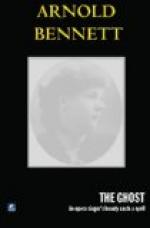At last, oh, powers of hell, I knew you! The inmost mystery stood clear. In one blinding flash of comprehension I felt the fullness of my calamity. This man that I had seen was not a man, but a malign and jealous spirit—using his spectral influences to crush the mortals bold enough to love the woman whom he had loved on earth. The death of Alresca, the unaccountable appearances in the cathedral, in the train, on the steamer—everything was explained. And before that coldly sneering, triumphant face, which bore the look of life, and which I yet knew to be impalpable, I shook with the terrified ague of a culprit.
A minute or a thousand years might have passed. Then Rosa returned. In an instant the apparition had vanished. But by her pallid, drawn face and her gray lips I knew that she had seen it. Truly she was cursed, and I with her!
CHAPTER XVII
THE MENACE
From the moment of my avowal to Rosa it seemed that the evil spirit of the dead Lord Clarenceux had assumed an ineffable dominion over me. I cannot properly describe it; I cannot describe it all. I may only say that I felt I had suddenly become the subject of a tyrant who would punish me if I persisted in any course of conduct to which he objected. I knew what fear was—the most terrible of all fears—the fear of that which we cannot understand. The inmost and central throne of my soul was commanded by this implacable ghost, this ghost which did not speak, but which conveyed its ideas by means of a single glance, a single sneer.
It was strange that I should be aware at once what was required of me, and the reasons for these requirements. Till that night I had never guessed the nature of the thing which for so many weeks had been warning me; I had not even guessed that I was being warned; I had taken for a man that which was not a man. Yet now, in an instant of time, all was clear down to the smallest details. From the primal hour when a liking for Rosa had arisen in my breast, the ghost of Lord Clarenceux, always hovering uneasily near to its former love, had showed itself to me.
The figure opposite the Devonshire Mansion—that was the first warning. With regard to the second appearance, in the cathedral of Bruges, I surmised that that only indirectly affected myself. Primarily it was the celebration of a fiendish triumph over one who had preceded me in daring to love Rosetta Rosa, but doubtless also it was meant in a subsidiary degree as a second warning to the youth who followed in Alresca’s footsteps. Then there were the two appearances during my journey from London to Paris with Rosa’s jewels—in the train and on the steamer. Matters by that time had become more serious. I was genuinely in love, and the ghost’s anger was quickened. The train was wrecked and the steamer might have been sunk, and I could not help thinking that the ghost, in some ineffectual way, had




